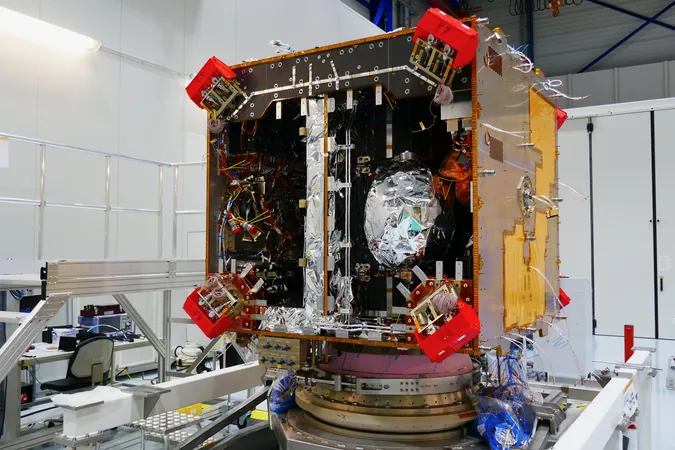
ORNL's Frontier Users’ Revolutionary Climate Emulator Eyes Gordon Bell Prize
2024-10-31
Author: Li
Introduction
In a groundbreaking achievement, a collaborative team from the King Abdullah University of Science and Technology (KAUST) in Saudi Arabia has been nominated for the prestigious 2024 Gordon Bell Prize for their innovative exascale climate emulator. This state-of-the-art tool promises a dramatic leap in predicting climate change while significantly reducing the computational resources typically required by advanced climate models.
Team Recognition
This nomination marks the fourth time since 2022 that KAUST researchers have been recognized for their contributions to climate modeling. Joining the team are experts from notable institutions including the National Center for Atmospheric Research, the University of Notre Dame, NVIDIA, Saint Louis University, and the Lahore University of Management Sciences. The winners of the Gordon Bell Prize will be revealed at the Supercomputing Conference in Atlanta, Georgia, from November 17 to 22, 2024.
Challenges in Climate Modeling
Marc Genton, an Al-Khwarizmi distinguished professor of statistics at KAUST, emphasized the intricate nature of climate models, which can require extensive timeframes for data processing, often resulting in massive datasets that pose significant storage challenges. "We have designed our emulator to address two key challenges: enhancing speed and minimizing storage,” Genton explained. “By storing only the emulator code and essential parameters, we can generate an unlimited number of emulations without the hefty data costs associated with traditional climate models."
Earth System Models and Their Limitations
Earth System Models (ESMs), which serve as pivotal tools for climate predictions, are known for their complexity. They take into account various atmospheric variables such as temperature, wind, and humidity, requiring immense computational power and energy consumption. Currently, the resolution of standard global climate models is about 25 kilometers, which is insufficient for localized climate phenomena. "Our emulator achieves a remarkable resolution of 3.5 kilometers, allowing for more accurate simulations of local conditions over short timescales," Genton noted.
Efficiency with Modern Technology
Utilizing cutting-edge graphics processing units (GPUs) and mixed-precision arithmetic, the team has achieved an unprecedented level of efficiency and speed in their climate simulations. By adopting mixed precision—what amounts to selectively applying different levels of numerical accuracy—they can optimize crucial calculations without wasting computational power on less critical data points.
Precision and Performance
For instance, calculating a temperature of 75 degrees doesn't require precision up to 17 decimal points; thus, this method speeds up performance significantly without sacrificing accuracy where it matters most. "This innovative approach has allowed us to maintain accuracy while accelerating our calculations," said Sameh Abdulah, the lead researcher.
Performance on Supercomputers
Over the past four years, the team has extensively refined their algorithms to ensure compatibility and optimal performance across various supercomputing platforms. Their emulator excels on elite supercomputers, boasting impressive speeds: it recorded 0.976 exaflops per second on the top-ranked HPE Cray Frontier supercomputer and 0.375 exaflops per second on the IBM Summit supercomputer.
Sustainability in Computing
The scalability of their emulator fosters a more sustainable computing approach; by reducing the time required to run simulations, it also minimizes energy consumption—an increasingly vital factor given the environmental impacts of high-performance computing.
Conclusion
While focused on winning the Gordon Bell Prize, the team's work has broader implications for climate science, offering critical insights into weather patterns, climate changes, and potential environmental impacts that are essential for informed policy-making and disaster preparedness.
The KAUST team is hopeful that their revolutionary emulator will not only win accolades but also pave the way for an era of more agile and efficient climate modeling—one that can keep pace with the pressing challenges posed by climate change.



 Brasil (PT)
Brasil (PT)
 Canada (EN)
Canada (EN)
 Chile (ES)
Chile (ES)
 España (ES)
España (ES)
 France (FR)
France (FR)
 Hong Kong (EN)
Hong Kong (EN)
 Italia (IT)
Italia (IT)
 日本 (JA)
日本 (JA)
 Magyarország (HU)
Magyarország (HU)
 Norge (NO)
Norge (NO)
 Polska (PL)
Polska (PL)
 Schweiz (DE)
Schweiz (DE)
 Singapore (EN)
Singapore (EN)
 Sverige (SV)
Sverige (SV)
 Suomi (FI)
Suomi (FI)
 Türkiye (TR)
Türkiye (TR)